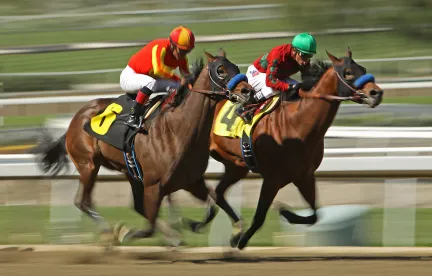On July 1, 2022, the Federal Trade Commission (FTC) will begin implementing the Racetrack Safety Rule, which is the first phase of a two-part scheme to create national standards for thoroughbred horse racing safety and welfare, as proposed by the Horseracing Integrity and Safety Authority (HISA). Established when Congress passed the Horseracing Integrity and Safety Act in 2020, HISA is responsible for drafting and enforcing uniform safety and integrity rules in thoroughbred racing in the United States. HISA drafts and prepares rules that it then proposes to the FTC to either adopt or reject. The FTC is the ultimate implementing and promulgating body of these rules.
HISA is comprised of two programs: The Racetrack Safety Program, which goes into effect July 1, 2022, and the Anti-Doping and Medication Control (ADMC) Program, which goes into effect in January 2023.
-
The Racetrack Safety Program includes operational safety rules and national racetrack accreditation standards that seek to enhance equine welfare and minimize equine and jockey injury. The program will expand veterinary oversight, impose surface maintenance and testing requirements, enhance jockey safety, regulate riding crop use, and implement voided claim rules, among other measures.
-
The ADMC Program will create a centralized testing and results management process and apply uniform penalties for integrity violations efficiently and consistently across the United States. These rules and enforcement mechanisms will be administered by a new independent agency, the Horseracing Integrity and Welfare Unit (HIWU), established by Drug Free Sport International (DFS). HIWU will oversee testing, educate stakeholders on the new system, accredit laboratories, investigate potential integrity violations, and prosecute rule breaches.
HISA requires all racing participants, or “covered persons,” to register themselves and any horses in their care with the authority before July 1, 2022. The registration requirements apply to “covered horses” and “covered persons.” The term “covered horse” means any thoroughbred that has completed a timed race and reported workout at a racetrack or training facility. 15 U.S.C. § 3051(4). A “covered person” participates in covered races and the care, ownership, treatment, and training of “covered horses.” 15 U.S.C. § 3051(6). These individuals include trainers, owners, breeders, jockeys, racetracks, veterinarians, and persons licensed by a state racing commission.
Since HISA creates a national standard, there are preemption considerations for the dozens of state racing commissions. HISA prohibits commissions and other state authorities from implementing inconsistent safety and anti-doping measures. Its preemption clause expressly precludes “any provision of State law or regulation” that conflicts with federal law 15 U.S.C. § 3045(b) (emphasis added). The strong language restricts states from requiring anything more or different from HISA’s safety regulations.
Several states already have raised their opposition to this federal preemption in federal court. Texas and the Texas Racing Commission (TRC) challenged HISA’s constitutionality, claiming a violation of the non-delegation doctrine and the due process clause. Most recently, Oklahoma, West Virginia, and Louisiana brought similar complaints in the Eastern District of Kentucky. Both challenges failed, with the courts upholding HISA’s constitutionality and ruling the authority follows an intelligible principle and functions subordinately to the FTC. Both decisions have been appealed.
Notwithstanding these unsuccessful challenges, states continue to air their concerns. On June 13, the TRC executive director announced that the TRC does not intend to comply with the FTC regulations, saying state law requires races in Texas to be run only under the authority of the TRC. In doing so, the TRC attempts to avoid HISA’s jurisdiction over interstate commerce by restricting its simulcasting from crossing state lines and prohibiting the import and export of pari-mutuel simulcast signals at its racetracks. This means patrons cannot engage in in-state wagering on imported signals and out-of-state wagering on Texas-based tracks.
The states’ focus on the wagering aspect of the races only addresses one component of the horseracing industry covered under the commerce clause. Since “interstate commerce” is often interpreted broadly, it can also include the equipment, horses, and participants from other states. Instead of escaping federal authority, Texas risks losing all income from exporting signal bets. Advance deposit wagering is illegal in Texas, meaning that patrons must make legal bets at a racetrack in the state. Their non-compliance may spark a substantial economic blow to their business and potentially plague other states if they follow Texas’s lead.
Ultimately, HISA is a federal mandate, and unless ruled unconstitutional, participants in the thoroughbred horse racing industry should plan to meet all registration requirements and safety requirements by July 1, 2022.1
FOOTNOTES
1 Due to supply chain issues causing inadequate inventory of compliant horseshoes and riding crops, HISA has postponed the implementation of safety rules regarding those items for 30 days, until August 1, 2022.




 />i
/>i
